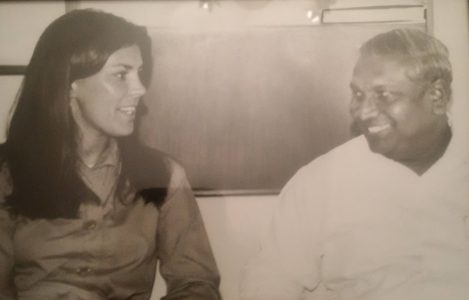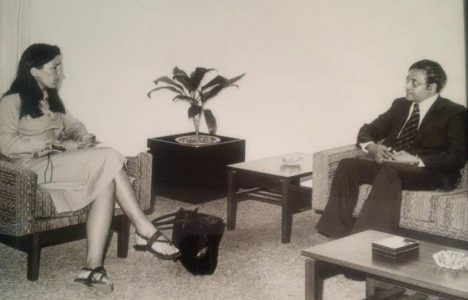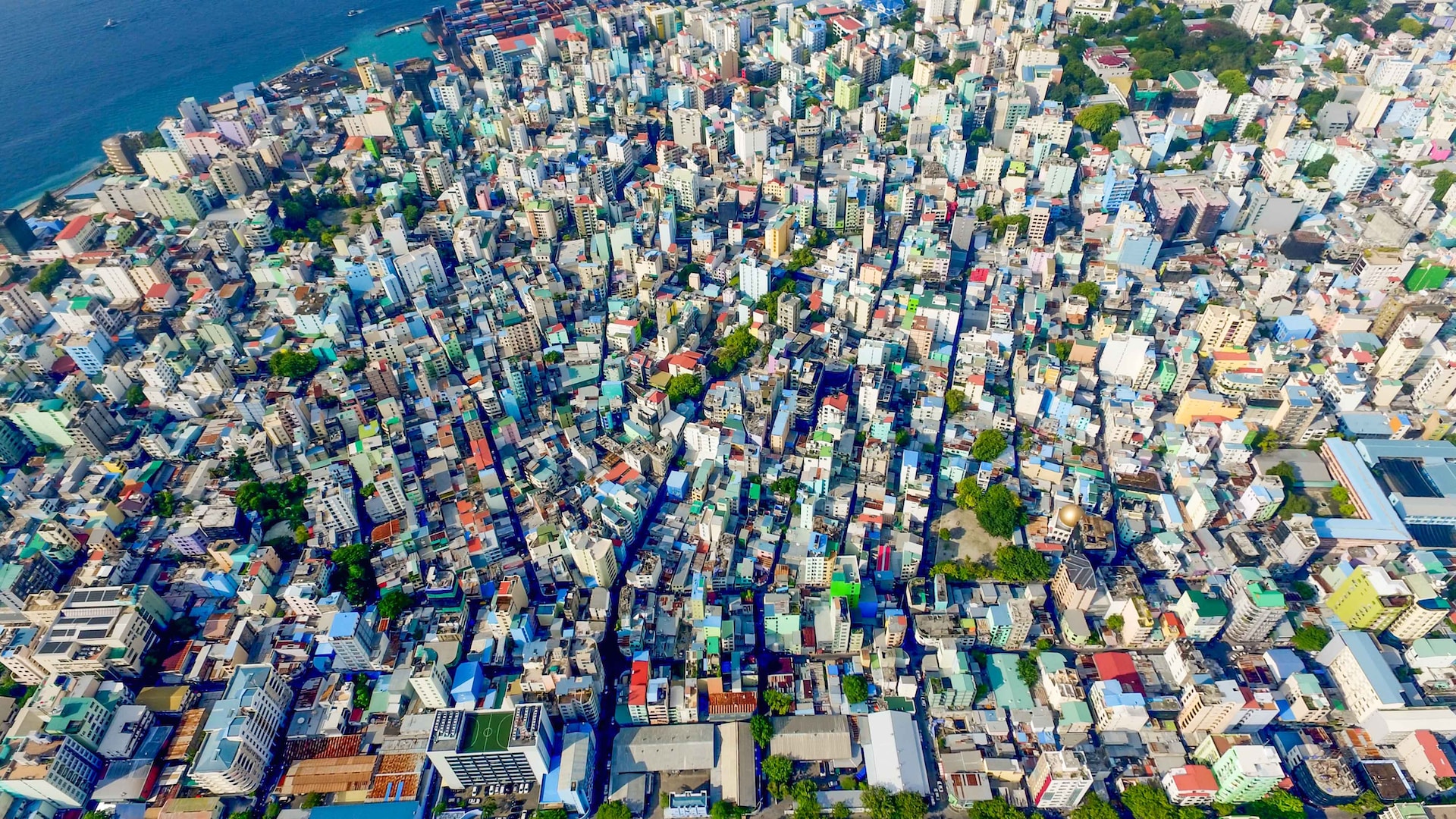As Cop28 ends in Dubai, Maldives is once again at the forefront of climate diplomacy with former President Nasheed being appointed as Secretary-General of the Climate Vulnerable Forum. Elizabeth Colton has been researching and writing on Maldives for a long time; in this post, she looks at Maldives’ tactful and self-invested diplomacy in maintaining foreign relations across the globe over the decades, surrounded as it is by the growing interests of China and India — and being amongst the earliest nations to raise the threat of global warming and climate change.
In October 1977, Maldives rejected a Soviet bid to lease the Maldivian southern island of Gan vacated by the British Royal Air Force in 1976. With this, President Ibrahim Nasir announced to the world a Maldivian foreign policy and diplomacy that continues till today. The story of a little country turning down a superpower made world news after I telex-ed my ‘scoop’ interview to Reuters on 26 October 1977 (and then Asiaweek, 25 November 1977). This is Maldives’ history, still remembered in the tiny, welcoming yet determinedly independent, nation.

Photo 1: Author interviewing President Ibrahim Nasir, 26 October 1977 © For copyright information, see below.
This year, the Maldives elected its eighth president (inaugurated on 17 November), with news headlines threatening a Maldivian tilt in the geopolitics of the western Indian Ocean, replacing the reported contest between superpowers India and China for influence over the Islands. Newly elected President Dr Mohamed Muizzu’s inaugural vow stated it clearly:
no external nation’s interests will supersede those of the Maldives and its people.
Foreign news coverage about the new Maldivian government overlooks the real story of Maldives’ dexterous diplomacy. The longtime foundation of its foreign policy of non-alignment or diplomacy seeking multilateral alignment goes back more than half a century: after declaring independence from her ‘protectorate’ status under the British in 1965, Maldives immediately sent a delegation to the United Nations to establish themselves as a new Republic, and launched their Tourism industry in November 1972.
Through its foreign policy, Maldives acknowledges that it needs to establish and maintain positive relations globally in pursuit of national interests. As an island country, it is dependent on a world of friends to maintain its position as a leading destination in world tourism and, also, the protection of fishing, its second vital national industry. Most importantly, Maldivian leaders recognise the need for friends worldwide to achieve the sustainable development goals of survival against global warming (and the ultimate possibility of an evacuation of her population).
Maldivian presidents (regardless of their opposing political positions) and their ministers have all worked to promote a unique foreign policy of independent global multilateralism. To understand this continuation of this basic component of Maldivian foreign policy — despite various political upheavals and electoral changes — it is worth taking an overview of Maldives diplomatic history since 1977.
*
When President Al Ameer Ibrahim Nasir declared Maldives’ foundational foreign policy of non-alignment, there were only two foreign missions (India and Pakistan) present on the Islands. Libya’s diplomatic mission arrived in 1978, the first of the oil-wealthy Islamic countries to give financial and ideological support for development of this 100 per cent Muslim nation situated strategically at the centre of the western Indian Ocean.
Following Nasir’s surprise resignation later that year, his successor President Uz. Maumoon Abdul Gayoom (a former member of Nasir’s cabinet and a UN delegate) re-affirmed his commitment to his predecessor’s policy of non-alignment. Gayoom and his longtime Foreign Minister Fathulla Jameel (who had also served in Nasir’s cabinet) steadily expanded the country’s non-aligned global outreach. Significantly, in 1987 and 1989, President Gayoom became the first Maldivian and world leader to speak out globally about the threat of global warming to his low-lying archipelago-nation.

Photo 2: Author interviewing then Minister for Transport (later President) Maumoon Abdul Gayoom, February 1978 © For copyright information, see below.
Likewise, President Mohamed (Anni) Nasheed, who in 2008 defeated longtime President Gayoom, dramatically increased Maldivian outreach by projecting his country’s image as a leader confronting the threat of global warming. In October 2009, with international video media coverage, Nasheed conducted an underwater Cabinet meeting in the tropical seas of Maldives. That same year, Nasheed stood out as a global leader and a frontline advocate in negotiations at the United Nations Climate Change Conference (the Copenhagen Summit Speech). He brought more world attention to his country’s climate crisis when he starred in the film ‘The Island President’ about the existential threat to his nation and his diplomatic negotiations at the Copenhagen Summit. The award-winning documentary was released in late 2011, not long before he was overthrown in a coup and forced to resign in February 2012.
Nasheed’s Foreign Ministers came with a variety of strong global connections. Dr Ahmed Shaheed, a former Foreign Minister in President Gayoom’s cabinet, brought much additional diplomatic experience from having worked in high level positions at the United Nations; the next Foreign Minister was Ahmed Naseem, who had been a member of Maldives’ first UN delegation and a leading founder of Maldives tourism.
After elections in 2013, the newly elected President Abdulla Yameen Abdul Gayoom, former minister of trade and later tourism in his half-brother’s cabinet, led his government in seeking massive international development loans worldwide, most successfully from China. Unsurprisingly, concern over Chinese debt and influence in Maldives became a major issue in the next (2018) elections that brought President Ibrahim (‘Ibu’) Mohamed Solih to power, along with his party’s strong links to India to counter his predecessor’s ties to China. Still, Maldives’ foreign policy remained one of global multilateralism.
President Solih’s engagement with the world was led by his highly experienced Foreign Minister Abdulla Shahid. A career diplomat who had previously served as Foreign Minister under President Maumoon Gayoom, Shahid was elected President of the 76th General Assembly of the United Nations in 2021 for a one-year tenure while continuing as the chief diplomat of the country. The ever globally active (now former) Maldives Foreign Minister Shahid is considered to be a potential future candidate for the position of UN Secretary-General.
Also, notably, working closely with Foreign Minister Shahid in President Solih’s government was Maldives’ High Commissioner to the United Kingdom Dr Farah Faizal who actively promoted her maritime nation’s leadership role in the Small Island Developing States (SIDS) organisation and in the Commonwealth of Nations.
*
Once again, in the latest Maldives election, a major issue was whether incumbent President Ibu Solih had sold out to India, the historic hegemon of the ocean bearing its name, by allowing Indian military bases on Maldives’ shores. Headlines played up the contrast presented by his political challenger Mohamed Muizzu, Mayor of the capital Male’ and a civil engineer with previous involvement in the earlier government’s links to Chinese infrastructure-building loans.
Upon Muizzu’s resoundingly winning the run-off election, two former Maldivian Foreign Ministers from different governments individually posted comments on X to counter the headline-grabbing world media coverage heralding a change in Maldivian foreign policy. That was not their view.
‘Judging by what [President-elect Muizzu] was saying in the campaign, [and] his managerial approach to work in his previous gov[ernmen]t roles, I don’t foresee any change in direction in FP [Foreign Policy]’, predicted Dr Ahmed Shaheed on X, former Foreign Minister in the cabinets of both Presidents Gayoom and Nasheed, and currently Professor at the University of Essex.
Another former Foreign Minister, Dunya Maumoon, who served in her uncle President Abdulla Yameen’s cabinet, also commented on X: ‘Is there a problem of being Pro-China? Maldives has completed many infrastructure projects with Chinese support. I am certain that His Excellency [President Muizzu] will be pro-many countries to further the development, pride and well-being of all Maldivians.’
In his inaugural address, President Muizzu declared:
Using the instrument of diplomacy, I will ensure that this country has no foreign military presence on its soil. I assure you there is no greater honour for me than being loyal to my beloved Maldives.
The next day the new President formally requested that India withdraw all Indian military personnel from Maldives.
Muizzu’s Foreign Minister Moosa Zameer was Minister for Tourism in the reputedly China-leaning government of Abdulla Yameen, but, as always, the new Maldivian government is already welcoming foreign emissaries from all countries, assuring them of continuing strong ties. President Muizzu has emphasised his intention to work closely with all countries, including India. Maldives is too small, he says, to take sides in a ‘geopolitical rivalry between bigger nations’. Barely a week after taking office, President Muizzu, along with his wife First Lady Sajidha Mohamed and his Foreign Minister Moosa Zameer, flew to Turkey to ‘enhance diplomatic relations’ en route to the CoP28 Summit in Dubai where former President Mohamed Nasheed has been appointed as the new Secretary-General of the Climate Vulnerable Forum (CVF), underlining Maldives’ continuing role as a leader in climate diplomacy.
*
Over decades, various governments of this small but diplomatically powerful nation have adhered to a foreign policy of global multilateral alignment with as many countries as possible. Maldivian leaders know their country needs everyone’s support. Yet, regardless of their reaching out to competing superpowers, nations and international organisations, Maldives always seeks to maintain its independence on the world stage. Her dexterous diplomacy demonstrates remarkable diplomatic balancing in a complex multilateral world, and in a strategic geopolitical terrain.
*
The views expressed here are those of the author and do not represent the views of the ‘South Asia @ LSE’ blog, the LSE South Asia Centre or the London School of Economics and Political Science. Please click here for our Comments Policy.
Copyright information © Photographs by Hassan Najmy, offical photographer of the Government of Maldives; used by permission of the author under the Creative Commons License/Fair Use policy of LSE blogs.
This blogpost may not be reposted by anyone without prior written consent of LSE South Asia Centre; please e-mail southasia@lse.ac.uk for permission.
Banner image © Ishan, Male, 2017, Unsplash.
*






I heard that Dr. Colton passed months ago, imagine my surprise when this article popped up on my feed. As always, her writing is enlightening!
Thank you Dr. Elizabeth Colton. A thought provoking and didactic article on the Foreign Policy of Maldives.